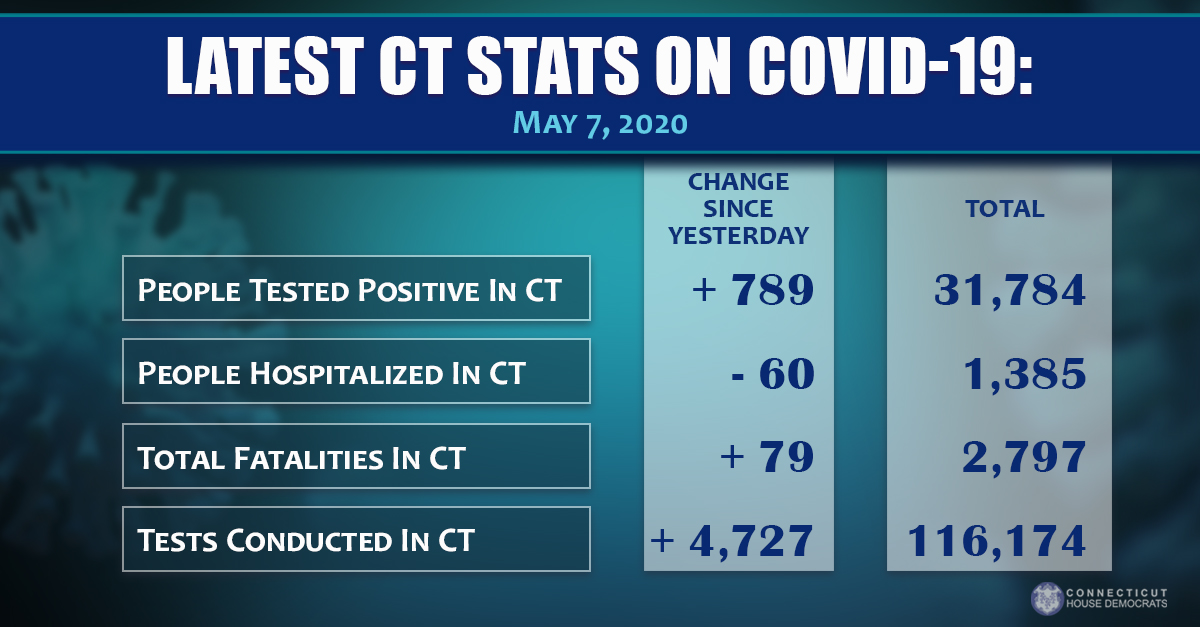| For several additional graphs and tables containing more data, including a list of cases in every municipality, visit ct.gov/coronavirus.
Governor Lamont signs Executive Order No. 7SS enacting the following provision:
· Permits the creation of a temporary nurse aide position to assist health care providers managing the COVID-19 pandemic and other health-related services during the pandemic.
Judicial branch announces resumption of partial operations at courthouses in Middletown, Rockville, and Litchfield
Chief Court Administrator Patrick L. Carroll III today announced that the Connecticut Judicial Branch will resume partial operations in three courthouses starting Monday, June 8, including the Middlesex Judicial District Courthouse in Middletown, Rockville’s Geographical Area No. 19 Courthouse, and the Litchfield Judicial District Courthouse in Torrington.
Ten courts have remained open through the pandemic: the Supreme and Appellate Courts, the Judicial District courthouses in Bridgeport, New Britain, New Haven, New London and the Geographical Area Courthouses in Hartford (No. 14) and Waterbury (No. 4); and the juvenile courts in Hartford and Bridgeport. Beyond these locations and the three courthouses resuming partial operations effective June 8, all other courts will remain closed until further notice.
For more information, read the press release issued today by the Connecticut Judicial Branch.
Testing data by town added to daily updates
The Connecticut Department of Public Health (DPH) continues its efforts to provide access to timely information on the COVID-19 pandemic by releasing detailed testing data each day. The State of Connecticut was among the first states to publish data on cases and deaths by town, cases and deaths by race, ethnicity and gender, on persons whose death certificate lists COVID-19 disease as a cause of death or a significant condition contributing to death (probable), and cases and deaths in nursing homes and assisted living facilities.
DPH continues to expand access to data as the pandemic evolves. Daily updates on COVID-19 cases are now available statewide for all 169 towns by date reported, and on total tests and cases by date collected and date reported. Data on testing, cases, hospitalization, and deaths are accessible via daily updates on the state’s COVID-19 portal – ct.gov/coronavirus – and the dedicated COVID-19 section of the state’s open data portal – data.ct.gov/coronavirus. The open data portal includes historical data, as well as the ability for users to download data, create charts, tables, and other visualizations.
Governor Lamont releases Reopen Connecticut report
Governor Lamont released his Reopen Connecticut report, which contains recommendations from the Reopen Connecticut Advisory Group – the panel of local health, business, workforce, and education experts who provided his administration and legislative leadership with recommendations on the reopening of Connecticut’s economy and education system as the nation emerges from the unprecedented public health emergency caused by COVID-19.
Throughout the pandemic, Governor Lamont has been using the advisory group’s recommendations, combined with inputs from state agency leadership, legislators, and other stakeholders, to inform his decisions on the reopening of the state.
With the release of the governor’s report, the Reopen Connecticut Advisory Group has adjourned its activities and will no longer meet, however the governor said he will remain in contact with its members over the coming months as the situation continues to develop. |






